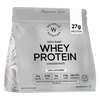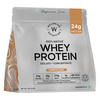Ever wondered why a simple meal can influence your mood? That’s because food isn’t just about fueling the body—it’s also about nourishing the mind. Protein, often hailed as the building block of life, plays a fundamental role in maintaining mental well-being. From supporting neurotransmitter production to regulating mood and energy levels, the right protein intake can be a great support for emotional resilience. However, not all proteins are created equal.
Let’s break down why protein is crucial for mental health and how you can incorporate them into your diet.
The Role of Protein in Brain Health
At its core, protein is made up of amino acids, the essential compounds that help produce neurotransmitters like serotonin, dopamine, and GABA—each playing a key role in mood regulation, stress management, and focus [NIH]. When your body lacks adequate protein, these neurotransmitters can become imbalanced, potentially leading to symptoms like anxiety, mood swings, and brain fog.
Think of it this way: Just as your muscles need protein for strength and recovery, your brain requires high-quality protein to function optimally. The right sources of protein can enhance cognitive function, improve stress response, and even support better sleep.
Protein Deficiency and Its Impact on Mental Health
A diet low in protein doesn’t just affect physical health—it can have a direct impact on mental well-being. Some common signs of inadequate protein intake include:
-
Increased stress and irritability
-
Lack of focus and concentration
-
Poor sleep quality
-
Low energy and fatigue
-
Heightened anxiety and mood swings
Your body thrives on balance. Without sufficient protein, the production of essential brain chemicals is disrupted, leaving you more susceptible to mental fatigue and emotional fluctuations.
The Best Protein Sources for a Happy Mind
While it’s essential to meet your daily protein requirements, the quality of protein you consume matters just as much. A combination of whole-food sources and clean protein supplements can help maintain brain health and emotional stability. Here’s how you can include high-quality protein in your daily diet:
Plant-Based Protein Sources
If you’re looking for vegetarian or vegan options, Indian diet offers some of the richest sources of plant-based protein:
-
Lentils (Dal) – Packed with protein and fiber, lentils are excellent for sustaining energy levels and supporting brain function.
-
Chickpeas (Chana) – A versatile source of protein, chickpeas help in stabilizing blood sugar, which is crucial for a balanced mood.
-
Moringa – Known as a superfood, moringa is rich in amino acids and helps reduce stress and anxiety.
-
Quinoa – A complete protein with all nine essential amino acids, quinoa is great for brain function and cognitive clarity.
-
Soy Products (Tofu, Tempeh, Soy Milk) – These provide a solid dose of plant-based protein, supporting neurotransmitter production.
-
Nuts and Seeds (Almonds, Walnuts, Flaxseeds, Chia Seeds) – Not just for protein, these are also rich in omega-3 fatty acids, which improve brain health.
Animal-Based Protein Sources
For those who consume animal products, high-quality protein sources include:
-
Eggs – Rich in choline, eggs support neurotransmitter function and help improve memory.
-
Greek Yogurt – High in protein and probiotics, it aids in gut-brain connection and mood regulation.
-
Chicken and Fish (Salmon, Mackerel, Sardines) – Excellent sources of lean protein and omega-3 fatty acids, both of which are vital for cognitive health and stress relief.
The Gut-Brain Axis: How Mental Health and Digestion Are Connected
Your gut health directly impacts your mental well-being, making digestion an important factor in how protein influences your mood [NIH]. A well-functioning gut ensures that protein is effectively broken down into amino acids, which in turn helps produce essential brain chemicals. Without proper digestion, even the best protein sources may not be fully absorbed, leading to deficiencies that can affect mental clarity and emotional stability.
Adding probiotics and prebiotics to your diet along with high-quality protein can optimize this process. Probiotics enhance gut microbiota, improving protein digestion and amino acid absorption, while prebiotics nourish the good bacteria in your gut, ensuring a smooth digestive process.
Some gut-friendly foods that complement protein intake include:
-
Fermented foods like homemade curd, idli, dosa, and kanji, support protein metabolism and nutrient absorption.
-
High-fiber foods like oats and psyllium husk support digestion and absorption of nutrients, ensuring the effective utilization of protein.
-
Bone broth, a rich source of collagen protein, which supports gut lining integrity and reduces inflammation, positively influencing mood and cognition.
-
Sprouted legumes and grains help improve protein digestibility and provide essential amino acids for neurotransmitter synthesis.
Making the Right Protein Choices
While whole foods should always be the foundation of your diet, sometimes our fast-paced lifestyles make it challenging to meet daily protein needs.
That’s where clean protein supplements come in. Choosing high-quality protein that is free from artificial additives, preservatives, and unnecessary fillers is key to ensuring optimal absorption and maximum benefits for your brain and body.
When selecting a protein supplement, look for:
-
A complete amino acid profile to support brain and muscle function.
-
Plant-based or grass-fed sources for clean nutrition.
-
Added digestive enzymes or probiotics to enhance absorption and gut health.
The Takeaway
Your diet plays a significant role in how you feel, think, and function. By ensuring you consume high-quality protein, you’re not just supporting your physical health—you’re also fostering emotional resilience, mental clarity, and overall well-being. Whether through nutrient-dense Indian foods or well-chosen protein supplements, prioritizing protein intake can be a simple yet powerful way to boost mental health.
So the next time you plan your meals, think beyond just calories. Think about how every bite contributes to a stronger, more balanced, and healthier mind.





















 DOWNLOAD NOW
DOWNLOAD NOW
